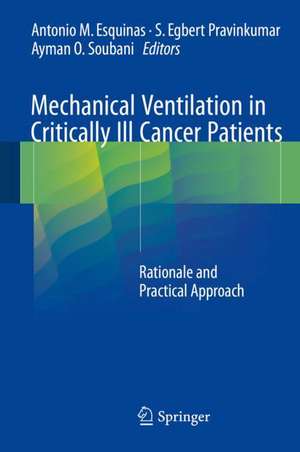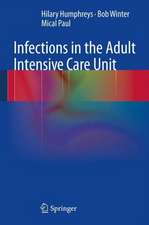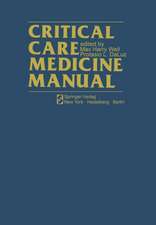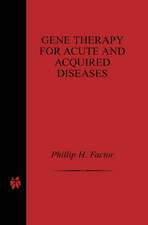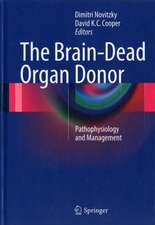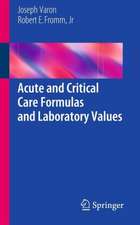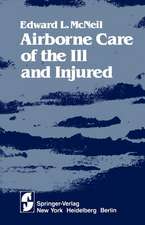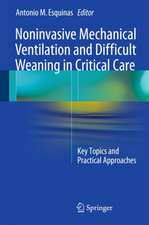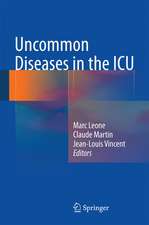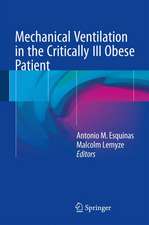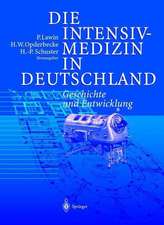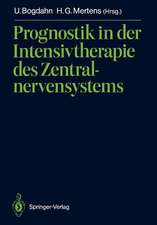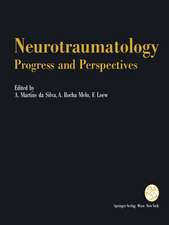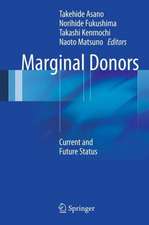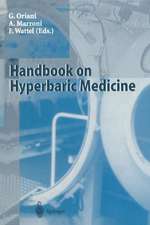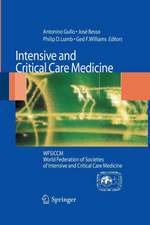Mechanical Ventilation in Critically Ill Cancer Patients: Rationale and Practical Approach
Editat de Antonio M. Esquinas, S. Egbert Pravinkumar, Ayman O. Soubanien Limba Engleză Hardback – 16 feb 2018
| Toate formatele și edițiile | Preț | Express |
|---|---|---|
| Paperback (1) | 595.58 lei 38-44 zile | |
| Springer International Publishing – 4 iun 2019 | 595.58 lei 38-44 zile | |
| Hardback (1) | 743.43 lei 38-44 zile | |
| Springer International Publishing – 16 feb 2018 | 743.43 lei 38-44 zile |
Preț: 743.43 lei
Preț vechi: 782.55 lei
-5% Nou
Puncte Express: 1115
Preț estimativ în valută:
142.26€ • 148.90$ • 118.40£
142.26€ • 148.90$ • 118.40£
Carte tipărită la comandă
Livrare economică 26 martie-01 aprilie
Preluare comenzi: 021 569.72.76
Specificații
ISBN-13: 9783319492551
ISBN-10: 3319492551
Pagini: 254
Ilustrații: XI, 368 p. 27 illus., 20 illus. in color.
Dimensiuni: 155 x 235 mm
Greutate: 0.86 kg
Ediția:1st ed. 2018
Editura: Springer International Publishing
Colecția Springer
Locul publicării:Cham, Switzerland
ISBN-10: 3319492551
Pagini: 254
Ilustrații: XI, 368 p. 27 illus., 20 illus. in color.
Dimensiuni: 155 x 235 mm
Greutate: 0.86 kg
Ediția:1st ed. 2018
Editura: Springer International Publishing
Colecția Springer
Locul publicării:Cham, Switzerland
Cuprins
Part I. Background and Therapeutic Procedures in Critically Ill Cancer Patients.- Epidemiology of Acute Respiratory Failure.- Acute Respiratory Failure in Different Settings.- Chemotherapy.- Radiation Therapy.- Blood Marrow Transplantation.- Bronchoscopy.- Non-bronchoscopic Procedures.- Invasive and Interventional Procedures.- Part II. Invasive Mechanical Ventilation.- Rationale.- Mechanical Ventilatory Modes.- Part III. Non-invasive Mechanical Ventilation.- Nasal High-Flow System.- Devices.- Continuous Positive Airway Pressure (CPAP).- Bilevel Positive Airway Pressure.- Indications and Contraindications.- Determinants of Success or Failure.- NIV Outcome Decision Algorithm.- Part IV. Postoperative Mechanical Ventilation.- General Postoperative Complications.- Mechanical Ventilation After Neurosurgery.- Mechanical Ventilation After Cardiothoracic Surgery.- Mechanical Ventilation After Thoracic Surgery.- Mechanical Ventilation After Abdominal Surgery.- Mechanical Ventilation AfterOrthopedic Surgery.- Part V. Withdrawal from Mechanical Ventilation Support.- Weaning from Mechanical Ventilation.- Tracheotomy.- Analgesia/Sedation.- Venous Thromboembolic and Gastrointestinal Prophylaxis.- Chest Physiotherapy.- Nutrition.- Long-Term Mechanical Ventilation.- Part VI. Palliative Ventilatory Support in Cancer Critical Care.- Palliative Care.- Avoidance of Endotracheal Intubation.- End-of-life Care. Part VII. Healthcare Resource Utilization and Organizational Support in Cancer Critical Care.- Organization of Ventilatory Support.- Healthcare Resources Ventilatory Support.- Quality-of-Life Ventilatory Support.- Mechanical Ventilation: Current Evidence and Evidence-Based Practice.
Recenzii
“This book is devoted to the identification and management of respiratory complications in critically ill cancer patients. … Critical care providers encountering patients with advanced malignancy and multimodal therapy are an appropriate audience for this international work. … This book provides effective background on mechanical pulmonary support and the challenges of oncology patients.” (David J. Dries, Doody's Book Reviews, April, 2018)
Notă biografică
Antonio M. Esquinas, MD, PhD, is a member of staff on the Intensive Care Unit and Non-invasive Ventilatory Unit at Hospital General Universitario Morales Meseguer, Murcia, Spain. Prior to taking up this position in January 2013, he worked in the Departments of Anesthesiology, Critical Care, and Pain Medicine at Sapienza University of Rome, Italy. Dr. Esquinas is a Fellow of the College of Chest Physicians and an International Fellow of the American Association of Respiratory Care. He is Director of the International School of Non-invasive Mechanical Ventilation and President of the International Association of NIV and the Ibero-American Association of Bioethics in NIV. He is the author of well over 700 scientific publications, including almost 400 articles and 32 books.
S. Egbert Pravinkumar, MD, FRCP, EDIC, is Professor and Associate Medical Director, Department of Critical Care, Division of Anesthesiology and Critical Care, The Universityof Texas MD Anderson Cancer Center, Houston, TX, USA. Dr. Pravinkumar completed his medical degree at Stanley Medical College and University Hospital, University of Madras, Madras, India and subsequently became a Member (1996) and then Fellow (2004) of the Royal College of Physicians of Ireland (Pulmonary Medicine/Internal Medicine). In 2006 he became a Fellow of the American College of Chest Physicians (Pulmonary/Critical Care Medicine). He is the author of 17 articles in peer-reviewed international journals.
Ayman O. Soubani, MD, is Professor of Medicine at Wayne State University School of Medicine, Detroit, MI, USA. He is Service Chief of the Pulmonary and Critical Care Section at Karmanos Cancer Center in Detroit and
Medical Director, Medical ICU, Harper University Hospital, Detroit. Dr. Soubani has appeared in both Best Doctors of America and America’s Top Doctors. He holds various professional appointments and is a past president of The Michigan Thoracic Society. Dr. Soubani is a member of the editorial boards of Respiration and The Open Transplantation Journal, and a reviewer for numerous journals. He is the author of 84 peer-reviewed journal articles.Textul de pe ultima copertă
This book aims to equip the reader to make optimal decisions on the use of mechanical ventilatory support in critically ill cancer patients with acute respiratory failure (ARF) and to implement the different strategies effectively. Detailed information is provided on the rationale for invasive and non-invasive ventilation, the different modes of ventilation, indications and contraindications, prognostic factors, and outcomes. The role of postoperative mechanical ventilation following various forms of surgery is extensively addressed, and key aspects of withdrawal from ventilatory support are discussed. Attention is also devoted to mechanical ventilation in the palliative care context. The concluding part of the book focuses on healthcare resource utilization and organizational support in cancer critical care. ARF is the most common reason for hospital and intensive care admission among oncological patients, and there is growing evidence that outcome following mechanical ventilation isimproving. Readers will find this book to be an invaluable aid when selecting and executing a strategy for management of ARF in individual cancer patients.
Caracteristici
Informs decision making in the use of non-invasive and invasive mechanical ventilation Considers novel non-invasive approaches Discusses the management of postoperative acute respiratory failure Describes supportive measures during the care of mechanically ventilated patients Covers aspects of health care resource utilization
